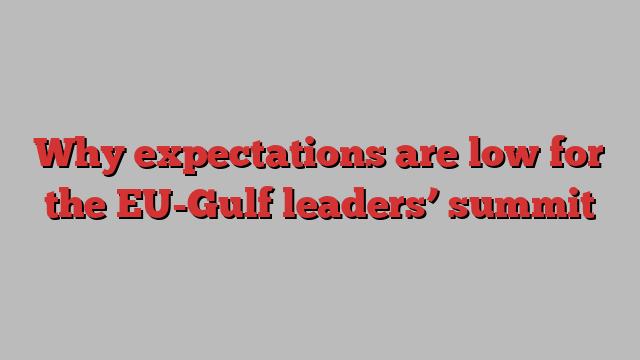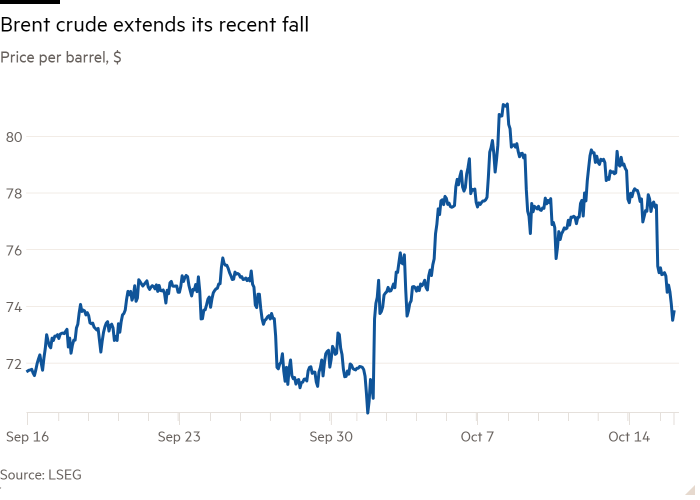
This article is an on-site version of our Europe Express newsletter. Premium subscribers can sign up here to get the newsletter delivered every weekday and Saturday morning. Standard subscribers can upgrade to Premium here, or explore all FT newsletters
Good morning. A scoop to start: Brussels plans to expand its antitrust powers in order to stop “killer acquisitions” that pose risks to start-ups in Europe and beyond, according to people familiar with discussions over how to overhaul the bloc’s merger rules.
Here, I preview what’s likely to be a lacklustre summit of EU and Gulf leaders today, and my Brussels colleague reveals a plea from the European Commission for member states to divert medical aid to Lebanon.
A widening gulf
The EU’s 27 leaders (or some of them, at least) will meet their counterparts from the Gulf today for a summit that’s set to deliver little more than vague pleasantries and air miles.
Context: Today’s meeting is the first ever leaders’ summit of the European Union and Gulf Cooperation Council member states since the two bodies signed a co-operation agreement in 1989. The United Arab Emirates, Bahrain, Saudi Arabia, Oman, Qatar and Kuwait are GCC members.
The timing is awkward, given the spiralling conflict in the Middle East, which is set to influence, if not dominate, the entire debate. The GCC average stance is far less pro-Israel than the EU, and world’s away from the position of Europe’s most staunch defenders of Israel, such as Hungary and the Czech Republic. So reaching agreement will be tough, if not impossible.
“We don’t see eye to eye on all topics and of course negotiating a statement with this part of the world is not always easy,” said one senior EU official involved in the pre-summit negotiations. “There are different positions, it’s not a secret, on these topics even inside the EU.”
Aside from the Middle East, leaders are expected to discuss the war in Ukraine, global challenges such as climate change, and bilateral issues such as trade. All are also expected to be thorny.
Most GCC states have good relations with Russia. That gives them leverage over Moscow, but also reason not to offend the Kremlin. On climate change, most are major oil or gas exporters, and are keen to continue doing so. And on trade, well, the EU and GCC launched negotiations for a Free Trade Agreement in 1990 and gave up 18 years later.
“When you have readiness [to engage], you might not achieve a perfect relationship, but at least you have commitment,” said the senior EU official. “It’s a risk you need to take.”
Chart du jour: Risk off

Oil prices fell sharply yesterday as fears that Israel would attack Iranian energy facilities receded and new forecasts damped the outlook for Chinese demand.
First aid
After weeks of condemning Israeli attacks on Lebanese civilians, EU member states now have a chance to offer practical help as the conflict-wracked country formally requests for medical aid, writes Andy Bounds.
Context: Israeli military action against Hizbollah militants has injured thousands but also damaged some health centres. Now Beirut has sent an emergency plea to Brussels for support.
European health commissioner Stella Kyriakides and crisis management commissioner Janez Lenarčič have written to the 27 national governments urging them to help.
The letter, seen by the FT, says the issue is of “utmost urgency” and the Lebanese authorities need “vital medical equipment and medication”.
“The healthcare system is unable to cope with the growing number of casualties. Many patients are in urgent need of specialised medical treatment that is not available due to the destruction of the healthcare infrastructure. It is crucial that we act swiftly and in a co-ordinated manner,” the commissioners write.
The bloc has already given an extra €40mn in emergency aid since Israel’s assault on the country which began last month, but in some cases patients are too ill to be treated in the country and may need evacuating to EU hospitals.
Kyriakides and Lenarčič have already set up a similar scheme for Gaza, where Israeli troops stormed hospitals they claimed were bases for militants of Hamas.
The programme, established in May with the help of the World Health Organization, has had limited success, especially as Israel’s tight grip on the territory prevents many people from leaving.
Only about 50 sick people from Gaza have been treated under the EU Civil Protection Mechanism to date, although the European Commission says national governments have their own schemes. On September 30 the EU co-ordinated the first medical evacuation directly from Gaza, rather than through neighbouring countries, transferring eight patients and 24 of their family members to Romania.
It was the fifth operation under a scheme that had already brought another 45 severely ill Palestinians to hospitals in Spain, Belgium and Italy. That is a small fraction of the 9,000 patients identified by the WHO in May, and the number has grown enormously since.
What to watch today
-
Summit of EU and Gulf Cooperation Council leaders, in Brussels.
-
Nato secretary-general Mark Rutte meets Prime Minister Ulf Kristersson of Sweden and holds a press conference.
Now read these
Recommended newsletters for you
Trade Secrets — A must-read on the changing face of international trade and globalisation. Sign up here
Swamp Notes — Expert insight on the intersection of money and power in US politics. Sign up here
Are you enjoying Europe Express? Sign up here to have it delivered straight to your inbox every workday at 7am CET and on Saturdays at noon CET. Do tell us what you think, we love to hear from you: [email protected]. Keep up with the latest European stories @FT Europe